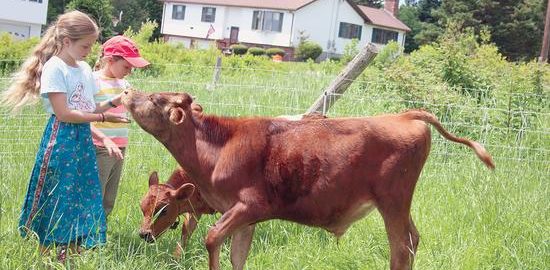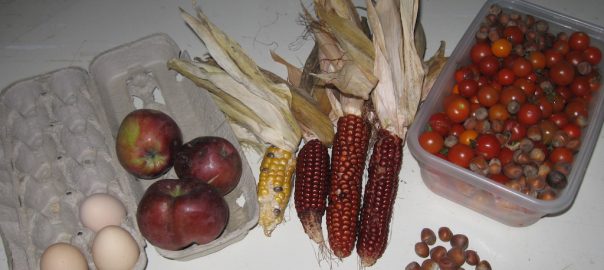Overview
When we want to support local agriculture we think first to plant a garden or organize a farmers market. But rarely do we take the next logical step, which is to use local law to protect that sustainable agriculture system that we’re trying to build. When we don’t take that step, agribusiness corporations step into the vacuum that’s created to monopolize food access. As our farming practices return to decentralized production, so too must the decision-making about that food.
La Via Campesina, an international peasant and indigenous farmers movement, coined the term “Food Sovereignty” in 1996 which they defined as the “right of peoples to define their own food, agriculture, livestock and fisheries systems, in contrast to having food largely subject to market forces.” Unlike the food security movement, aimed at ensuring that people have enough to eat, food sovereignty focuses on the question of who controls local food and agriculture policy. Who holds the power to determine those policies? Who sets goals and designs policy? Politicians? Corporations? Or the people directly affected by such policies?
As former Secretary of State Henry Kissinger once said, “Control oil and you control nations; control food and you control the people.” Let’s remember some examples of corporate attempts at control over food systems:
- Genetic engineering and forms of biopiracy like seed patenting
- Financial instruments preying on farmers like the revolving wheel of debt
- Encouraging dependence on high-energy inputs (fertilizers, pesticides) often leveraging influence over university and extension agency experts to promote their use
- Collusion with government to regulate out of existence the small family farm by insisting on a “level playing field” (that is industrial in scale). The Food Safety Modernization Act (FSMA) is the latest example of this.
- Crafting a narrative of food safety that implies all food producers are producing for national and global markets, and that all operations therefore require bureaucratic oversight and expensive equipment to ensure food safety.
- The well-known revolving door between agribusiness and regulatory agencies that write, implement and enforce food system policy
Big solutions to big problems often recreate the problem in a new form. Small scale solutions have the advantage of being site- and situation-specific and being more amenable to incremental organic adaptation with less risk of failure causing higher order systemic failures. For example, a local raw milk Community Supported Agriculture system has some real (very low) risk of causing illness but large scale corporate supply systems of industrial milk have created problems where large numbers of people spread across countries become sick before corrective responses can be enacted. A vision of small-scale site-specific corrective action is offered by the political project of food sovereignty. Food sovereignty is based on the right of peoples to define their own food systems and to develop policies on how food is produced, distributed and consumed. It is above all a political call for action that it is based on empowerment processes and the generation of critical knowledge in support of the collective and popular construction of alternatives.
Food Sovereignty as it has emerged in Maine is the concept that people who eat and those who grow food should be at the heart of designing food systems policy instead of large-scale industrial “food commodity” manufacturers or government bureaucracies. Food sovereignty as a political movement asserts the right of people in a geographic place to grow food, save seed and exchange products of the home economy free from government interference as long as sales are direct from producer to patron. All other food production regulations apply if you are selling to retail venues like restaurants and grocery stores.
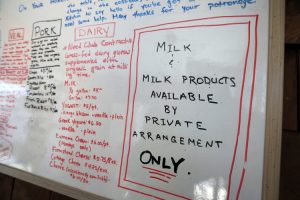
In this Friday, April 15, 2016 photo, a sign gives notice to customers at the Quill’s End Farm, a small family run operation in Penobscot, Maine. (AP Photo/Robert F. Bukaty)
This concept has yielded a strategy asserting a legal space usually within a municipality where residents have the guaranteed right to save seeds, grow their own food, and exchange it with each other in face-to-face venues (like roadside stands, church potlucks, and farmer’s markets). The strategy was borne out of resisting corporate control of our food systems in our home towns using locally binding law, which is much more accessible than state or federal levels of legislation. In Maine it takes the form of municipal ordinances. These ordinances are rights-based rather than regulatory in nature.
Instead of regulating what you can and can’t do, a rights-based ordinance leverages language usually found in state constitutions that declare the inherent right of the people of a state to self-governance. Rights-based ordinances declare and secure rights in a positive and guaranteed way. In the United States, authority is often delegated throughout the varying levels of government. In home rule states, authority in matters of self-governance are decentralized to the local level, and people within a municipality can create governance as they see fit so long as it doesn’t conflict with or frustrate the purpose of higher state or federal legislation. On matters of food and water, it is sometimes unclear who has the ultimate jurisdiction to make these sorts of policy decisions. We assert that if there is any uncertainty about what polity has the decision-making authority regarding matters of food and water, that authority should devolve to the local level. Rights-based ordinances (RBOs) secure these rights over the supposed rights of corporations and claimed authority of regulatory agencies, which are often not legitimate and dominated by corporate influence. RBOs reinforce the civil and political rights of people in their communities and allow them to make determinations about the health, safety and welfare of their town.
Food sovereignty has enjoyed a good deal of success in Maine because of a number of factors. Culturally, Mainers are an independent lot and maintain traditions of homesteading, self-reliance and self-governance. Many towns practice direct democracy at the municipal level. The process for getting on the agenda before a select board or city council is straightforward, accessible and often welcome. In both statute and constitution, the state of Maine grants authority to towns to pass ordinances that deal with matters “local in nature” that affect health, safety and welfare. It would seem that there are no matters more local in nature than the procurement of food and water for general welfare. When it comes to designing food policy, the idea here is to privilege the voices of consumers and primary small-scale producers that directly feed local patrons, rather than corporate agribusiness or entrenched government bureaucracies. Many farms are small-scale family owned operations, and Maine enjoys a relatively youthful farmer demographic that is actually getting younger, bucking the national trend. There are even cases of people relocating to Maine specifically to begin an agricultural enterprise because their town has passed a food sovereignty ordinance.
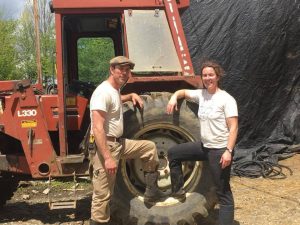
Heather and Phil Retberg of Quill’s End Farm were instrumental in crafting Maine’s first food sovereignty ordinance
These food sovereignty ordinances in Maine are formally titled the Local Food and Community Self Governance Ordinance (LFCSGO). The LFCSGO used language from rights-based ordinances in Shapleigh and Newfield, Maine as a template. These RBOs prevented Nestle from taking water from their shared aquifer to bottle and sell back to them. These were ordinances drafted by the Community Environmental Legal Defense Fund (CELDF), which pioneered the use of RBOs in places as near as Pennsylvania and as far as Ecuador. Food freedom bill proposals from Wyoming and Florida also provided inspiration for the text of the LFCSGO. (source link)
First formulated in 2011 as a response to industrial scale food processing regulations applied to small-scale operations, the LFCSGO was first passed in Sedgwick, Penobscot and Blue Hill and quickly spread to other towns in a process called “horizontal diffusion.” A key feature is that the ordinance language is usually uniform across different towns because we all use the same ordinance template as a starting point. “Horizontal diffusion” occurs in the context of a “standard of uniformity.” When ordinances spread town-to-town across the state in a bottom-up fashion, it is helpful to selectmen, councilors, and legislators to see standardized and uniform language. If officials see a precedent from another municipality, they are more likely to adopt it.
These ordinances have always been about small scale and face-to-face sales directly to patrons of the farm. The idea of making exemptions from corporate and industrial style regulations struck a nerve with Mainers. The LFCSGO was adopted in many towns across the state as activists flooded the state capital to pass state-level legislation that mirrored the town ordinance in spirit and content. State-level bills were narrowly defeated in 2012 and 2014, and then finally in late 2017, the legislature passed what ultimately became The Maine Food Sovereignty Act. This process is called “vertical integration.” Unfortunately, it had to be amended in a special session to take some food out of “food sovereignty” because the USDA, a federal agency, claims jurisdiction over the regulations around animal slaughter. So while The Maine Food Sovereignty Act doesn’t pertain to meat sales, it does recognize and codify the long standing tradition of face-to-face sales at local venues of all other locally-produced food.
So we have a focus on local rules for local food grown by small-scale operators using bottom-up democracy in action by leveraging local, state and federal law. The exciting pattern that emerged was “horizontal policy diffusion” (influence on other localities facing similar situations) resulting in “vertical policy integration” (influence on policy design and implementation at upper political and administrative levels), largely made possible by a “standard of uniformity” (most food sovereignty ordinances use the same language set forth in the LFCSGO template). We think the time is right to spread these sorts legal strategies to help rebuild local economies, especially to other home rule states.
Why You Should Care (source link)
Industrial Agriculture Is Not Sustainable
Our current system of agriculture, which substitutes chemicals for living soil, is not sustainable. It is killing soil, creating dead zones in the oceans, pouring greenhouse gases into the environment, and destroying biodiversity. The earth is our only home, and we must learn to relate to it as a living system, not as an environment we can exploit for profit, while killing its ability to regenerate.
Corporate Agriculture Is Not Healthy
We are having epidemics of health problems created by modern agriculture, especially obesity, diabetes, heart disease and cancer. Many of these problems are the result of marketing unhealthy food directly to children. We need healthy soil to raise healthful food, both plant and animal. When food-borne pathogen outbreaks occur within our large-scale industrial system, it can make large numbers of people sick before recalls are issued.
Local Food Brings Local Prosperity
Our oligarchic food system sucks money out of our local communities and concentrates it in the hands of a few multi-national corporations. Eating locally-produced food circulates money locally and strengthens local economies. A thriving local food system means more jobs and a more vibrant and healthy economy. It also builds the resiliency needed when times get tough. Local food tastes good, too!
Food Strengthens Communities
Breaking bread together is a time-honored way of celebrating life in community. Church suppers, bake sales, Grange pig roasts, potlucks and other gatherings bring people together. It is hard to be disagreeable to people when you are all eating together! And when people care about food, they care about people and find ways to make sure that everyone gets to eat.
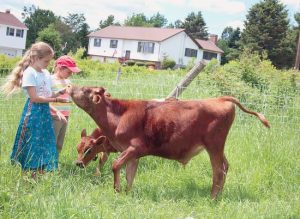 What you can do
What you can do
Talk to your neighbors about this issue to get them interested. Rally a few friends and learn what it takes to bring legislation before your town government. Sometimes government officials will say that you can’t make these kind of policy changes. Do it anyway! Find allies both in town and in town government. Use the LFCSGO template as a starting point. If you live in Maine, you benefit by using this template because it has been passed in over 40 towns. Make sure your legislation protects sales at roadside stands, church potlucks, and farmer’s markets (all of which are allowed under the 2017 Maine Food Sovereignty Act). If you live outside of Maine, the language may largely apply, and you can customize it to make your own template to share across towns. Learn about your state’s laws and find leverage points in agricultural related statutes. Once you get familiar with the legal language, you can hone your arguments using various levels of law. After that, use the tools of rhetoric and debate to start conversations and build a local coalition to bring locally binding food sovereignty legislation to your town.
Here are a few ways to talk about food sovereignty with your neighbors
What it is
- A rights-based ordinance, using locally binding law to secure rights for residents. It is not regulatory, does not add to responsibilities and services of government, and creates no bureaucracy. It has the force of law and goes beyond a municipal resolution or statement of support.
- It is scale-dependent. It applies to products of the home economy. If you want to sell to restaurants or retail distributors like grocery stores, all other food production regulations can apply.
- It is compliant with federal constitutional law, state constitutional law, and state statutes in Maine. It is a targeted application of the Home Rule law giving municipalities and counties the right to exempt direct farm-to-consumer sales, roadside farm stands, farmers markets and community potlucks from regulations designed for industrial-scale producers.
- It is traditionalist. It protects our way of life, local culture, food sources, the right to grow and exchange food, and the right to a local food economy.
What it does
- This reduces the regulatory burden for the small (or new) farmer. It would allow small-scale farmers to begin operating without the need to install costly commercial equipment or facilities for each separate operation. It lowers the barrier to entry into the marketplace and allows new farmers easier access to direct-sales markets. This has tangible economic benefits by circulating money in the local economy.
- It places emphasis on responsibility of producers and patrons. It is a push-back against the bureaucratization of everyday life, and enshrines the legitimacy of handshake deals and direct “me-to-thee” relationships.
- “Me-to-thee” transactions are based on trust. The local food movement is reconstituting a culture of independence, self-reliance, freedom of choice, and responsibility. Producers are responsible for producing high-quality safe food. Consumers are responsible for the choices they make.
- As an issue it can unite people across the political spectrum (after all, everyone has to eat!). The rhetoric of sustainability and resilience can appeal to liberals and leftists while the rhetoric of preserving tradition and independence and eliminating barriers to trade can appeal to libertarians and conservatives.
- Localized food systems are resilient against economic, environmental, and other stressors. We don’t know what our climate, economy, or society will look like in 20 or 50 years, and we should build systems and structures (not just related to food) that will lead to prosperity in a variety of futures, some of which may involve the weakening of national and global supply lines.
- A strong local food economy can attract people and new business to town. It will incentivize the growth of food-related business. It will reinforce your town’s position as a leader in local food culture.
- We need more farmers and more food producers. The food economy forms the bedrock foundation of any economy. Without food, no one works. This ordinance would set the conditions for a much more resilient food system in Maine of small-scale distributed production and peer-to-peer sales. This ordinance would set the conditions not only for a resilient food system, but also a more resilient localized economy.
- It improves access to locally grown food too, by the way.
What it does not do
- This does not apply to producers who wish to sell to a retailer or distributor like a restaurant or grocery store. Again, it is a scale-dependent idea.
- It does not exempt the municipality as a whole from state and federal food regulations. It only exempts small-scale growers making direct-to-patron transactions.
- It is not without risks. We can’t protect people from everything. The preferred yardstick in the discussion of risk analysis is raw vs. pasteurized milk. Your risk of being struck by lightning is greater than your risk of getting sick from raw milk. The risk you take every day driving in a car is greater. The risks to food safety are overblown by fear mongering, especially given the food pathogen outbreaks already common to our globalized, industrial food commodity system that can poison large numbers of people.
We’ve tried big, centralized food manufacturing, now let’s try local and decentralized food culture, as we have for most of human history! This sort of ordinance creates the legal space for products of the home economy to easily change hands between neighbors. Ultimately this ordinance that enshrines food sovereignty stems from a vision of how we can structure society to meet our basic needs. A broad sketch of this vision looks small in scale, localized, decentralized, with food production distributed throughout the landscape. The vision we find most attractive comes from agroecology and permaculture design that incorporates good landscape design with perennial food producing trees, shrubs and herbs. We imagine biologically diverse garden landscapes in every back yard with fruits, nuts and spices dripping from the branches and poultry or some other small livestock foraging in the understory. This vision integrates biological diversity with economic resilience and personal responsibility. The resources to help you pass an ordinance like this are ready to hand.
Please reach out and pass one in your town!
Further reading:
Templates and organizing resources for creating food sovereignty ordinances in your town
http://localfoodrules.org/
Deep back story of food sovereignty
https://www.sourcewatch.org/index.php/Via_Campesina#Food_Sovereignty
This issue of Justice Rising is packed with information about the local food ordinance and some of the important issues that are related to it.
http://www.thealliancefordemocracy.org/html/eng/2602-AA.shtml
This article traces the history of how meat production, processing, and distribution was made possible by USDA regulation
https://www.farmtoconsumer.org/blog/2015/09/10/the-wholesome-meat-act-of-1967-disaster-for-small-slaughterhouses-from-the-start/
This article traces a longer history including the emergence of the supermarket, as well as the constitutional basis for food sovereignty as an inalienable right
http://inlandfoodwise.online/archive/september-1-2017/are-people-allowed-to-feed-each-other-food-sovereignty-in-the-inland
Home Rule in the United States
https://en.wikipedia.org/wiki/Home_rule_in_the_United_States
List of New England Home Rule States:
Maine
Massachusetts
Rhode Island
Connecticut
-also-
New York
New Jersey
Pennsylvania
Notable absences
Vermont
New Hampshire
Jesse Watson is a permaculture designer, teacher and builder living and working in Rockland Maine, where we passed the LFCSGO in May 2018. He operates Midcoast Permaculture Design (midcoastpermaculture.com), serving residential, farm and institutional clients. He helps facilitate permaculture design certificate (PDC) courses with The Resilience Hub, based in Portland. He now serves on the board of directors of PAN, the Permaculture Association of the Northeast.



